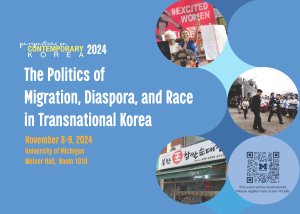Presented By: Nam Center for Korean Studies
Perspectives on Contemporary Korea 2024 | The Politics of Migration, Diaspora, and Race in Transnational Korea
Organizers: Jaeeun Kim (Department of Sociology, University of Michigan) Youngju Ryu (Department of Asian Languages and Cultures, University of Michigan)

Co-sponsored by Korean Studies Promotion Service, Academy of Korean Studies [AKS-2018-LAB-2250001]
Attend in person or via Zoom: https://myumi.ch/ypy1y
While South Korea had long been the major source of emigrants fleeing poverty and political turmoil in their homeland, it has emerged since the early 1990s as one of the most popular migrant destinations in East Asia. The ethnic Korean population outside the Korean peninsula now includes not only the descendants of colonial-era migrants to Japan and Manchuria, but also the post-1960s emigrants to North America, a large size of adoptees in North America and Northwestern Europe, and educational migrants and Christian missionaries across the globe. Migrants in South Korea are equally diverse. They include: labor migrants in agricultural, manufacturing, and service sectors; marriage migrants constituting the fast-growing “multicultural families”; asylum-seekers from across the world; and international students and English teachers recruited by educational institutions. North Korean and ethnic Korean migrants from China also constitute a significant portion of migrants in South Korea. This two-day conference will explore the politics of migration, diaspora, and race in transnational Korea—the topic that has moved Korean Studies in a transnational direction in the past decade or so. The approach will be interdisciplinary and comparative, with the panelists from sociology, anthropology, political science, and media studies, and with broader East Asia as a comparative horizon.
If there is anything we can do to make this event accessible to you, please contact us at ncks.info@umich.edu. Please be aware that advance notice is necessary as some accommodations may require more time for the university to arrange.
View the conference website for more details: https://myumi.ch/bE38y
Attend in person or via Zoom: https://myumi.ch/ypy1y
While South Korea had long been the major source of emigrants fleeing poverty and political turmoil in their homeland, it has emerged since the early 1990s as one of the most popular migrant destinations in East Asia. The ethnic Korean population outside the Korean peninsula now includes not only the descendants of colonial-era migrants to Japan and Manchuria, but also the post-1960s emigrants to North America, a large size of adoptees in North America and Northwestern Europe, and educational migrants and Christian missionaries across the globe. Migrants in South Korea are equally diverse. They include: labor migrants in agricultural, manufacturing, and service sectors; marriage migrants constituting the fast-growing “multicultural families”; asylum-seekers from across the world; and international students and English teachers recruited by educational institutions. North Korean and ethnic Korean migrants from China also constitute a significant portion of migrants in South Korea. This two-day conference will explore the politics of migration, diaspora, and race in transnational Korea—the topic that has moved Korean Studies in a transnational direction in the past decade or so. The approach will be interdisciplinary and comparative, with the panelists from sociology, anthropology, political science, and media studies, and with broader East Asia as a comparative horizon.
If there is anything we can do to make this event accessible to you, please contact us at ncks.info@umich.edu. Please be aware that advance notice is necessary as some accommodations may require more time for the university to arrange.
View the conference website for more details: https://myumi.ch/bE38y